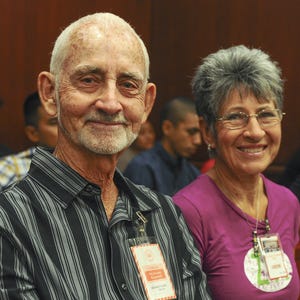The Commission on Decolonization launched its first community conversations meeting at Senator Angel Santos Park in Hagåtña on Monday where island residents were invited to discuss Guam’s yet-to-be scheduled political status referendum.
Monday’s gathering at Santos Park, or Latte Stone Park, was the first in a series of 108 meetings scheduled throughout this year, as the commission works to educate the island on its decolonization efforts.
Several government officials and island leaders, including Guam Delegate Madeleine Bordallo and Sen. Rory Respicio, D-Agana Heights, attended the inaugural event. Both politicians are running for re-election.
The idea behind the community meetings, Respicio said, was to get everyone in the right frame of mind regarding decolonization and what the three political status options mean for Guam.
Representatives from each of the commission’s three task forces were there to answer the public’s questions and give brief presentations about the three political status options: independence, statehood or free association.
Miyah Max, 19, a Guam Community College student, said she wanted to attend the meeting so she could learn more about the statehood and free association options.
The education major said she’s currently leaning toward independence. After a guest speaker spoke about decolonization and leaving the U.S. in one of her classes recently, the idea of independence resonated with her.
Many of the individuals who attended the meeting were part of the Independence for Guahan Task Force. The independence group also has been busy lately, launching its separate outreach initiative last month.
Independence member Melvin Won Pat Borja, 35, said he was pleased the commission was beginning to hold the community meetings, but said more still needs to be done from all the groups in order to reach Guam’s youth who are going to be impacted the most by the decolonization vote.
As a task force, Borja said the group has talked about reaching out to more of the high schools and hopes to continue the decolonization debates that the commission started this past spring.
As for Guam’s potential plebiscite, Borja said there shouldn’t be any rush to hold it until at least the 2020 General Election. He said the commission and task forces should specifically be working to educate those who are high school freshman and older so by the time they’re eligible to vote in 2020, they’ll be more knowledgeable about the implications of the vote.
Max, who’s a freshman in college this year, said she didn’t know anything about the plebiscite or decolonization efforts in her four years of high school. She said there should be after-school clubs dedicated to the plebiscite.
The plebiscite, which is a non-binding referendum, would measure the preferred political status of the island’s native inhabitants in regards to Guam’s future relationship with the U.S.
Gov. Eddie Calvo previously has stated that he wanted to hold a plebiscite in 2018, but earlier this year he announced his proposal to have it occur in November with the General Election.
The latter plan will not come to fruition while litigation challenging the proposed political vote is currently underway in federal court. The governor also had planned to launch the aggressive education campaign in the spring ahead of making a final decision in July, but the initiative never fully got off the ground.
Guam resident Arnold Davis, who is neither legally nor ethnically Chamorro, has challenged the local government’s proposed election because he doesn't meet the legal definition of native inhabitant.
Davis and his attorney argue that the local law limiting the vote to only Chamorro citizens is discriminatory.
The independence task force plans to hold its next general assembly on Sept. 22 at 6 p.m. in the main pavilion of Chamorro Village.
The decolonization commission’s next community conversation will occur next Monday in Agat where six conversations will be held.


No comments:
Post a Comment